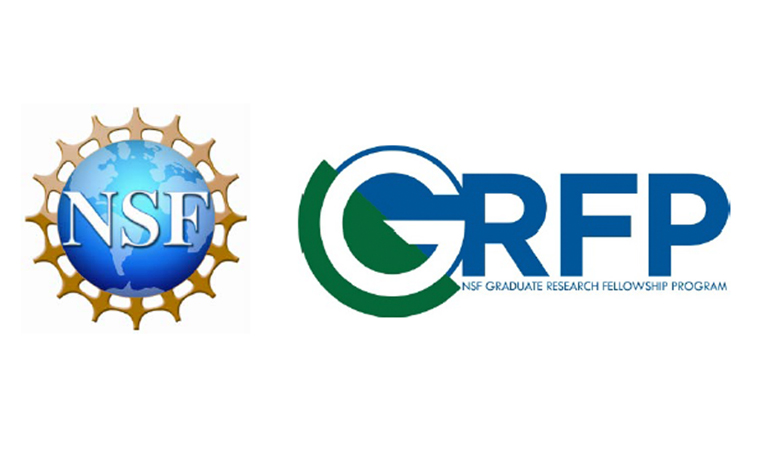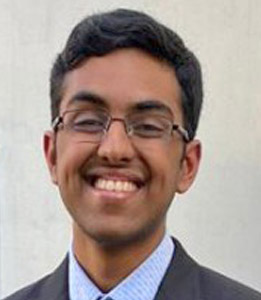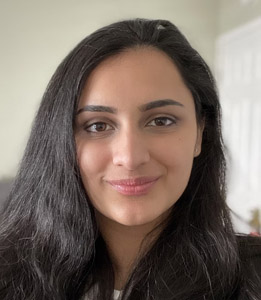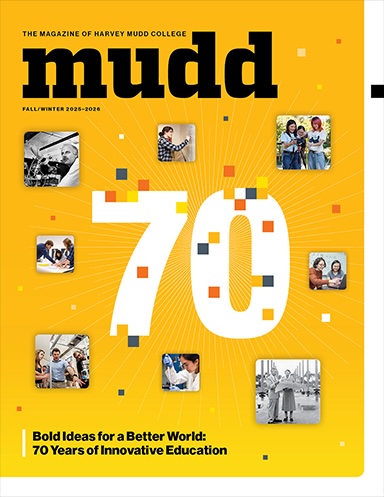NSF 2025 Graduate Research Fellowship Awards
May 20, 2025
Four Harvey Mudd College seniors and seven recent graduates have been awarded fellowships through the National Science Foundation (NSF) Graduate Research Fellowship Program (GRFP). One senior and seven recent graduates earned honorable mention.
The GRFP recognizes and supports outstanding graduate students in NSF-supported science, technology, engineering and mathematics disciplines who are pursuing research-based master’s and doctoral degrees at accredited U.S. institutions. Program participants are seen as future experts who will contribute significantly to research, education and innovation in the STEM fields.
[NOTE: This article reflects changes to awards made by the NSF on June 13.]

Laney Goldman ’25, a joint computer science and mathematics major, conducted research across several prestigious programs and institutions. In quantum optics, she developed a neural network to verify quantum entanglement by predicting the most informative measurements, achieving a 94% success rate using a custom-designed loss function. At Yale University, she contributed to graph neural networks by modifying the geometric scattering transform (a mathematical pre‐built graph neural network) to retain more signal-level information, improving classification accuracy by 10%.
Her work in combinatorics at Williams College extended the concept of De Bruijn sequences—a well studied object in computer science—to polyominoes, creating the notion of “prismatic polyominoes.” She developed theoretical tools to determine minimal configurations and proved closed-form formulas for specific cases, along with novel constructions using two colors.
During industry internships, Goldman worked with Harvey Mudd mathematics professor and CEO of Dasion Weiqing Gu as a machine learning engineer, improving autism diagnostic models using multimodal data and dimensionality reduction techniques. Goldman also contributed production-level audio processing code and mentored high school interns. Earlier, at Carbon, she supported the product management team with internal data visualization to aid product management decision making.
Goldman is pursuing a PhD in algorithms, combinatorics and optimization at Georgia Tech.

Anna Rogers ’25 is an accomplished chemistry scholar whose undergraduate career was marked by a passion for research and leadership. She contributed to a range of advanced research projects. With Professor Matthew Kromer, she studied redox dimerization syntheses of organic compounds using electrochemical characterization techniques, namely potentiometry and cyclic voltammetry and revamped a lab for the Instrumental Analysis chemistry course. In engineering Professor Whitney Fowler’s labshe researched the fluorescent properties of peptide amphiphiles for use as water contaminant sensors. Her chemistry senior thesis explored enhancing the fluorescence of peptide materials by forming electrostatically cross-linked hydrogels.
Rogers also broadened her research experience through competitive summer programs. At UC Riverside, she synthesized photothermal and magnetic nickel nanoparticles for potential applications in drug delivery and microfluidics. Most recently, she served as a process chemistry intern at Gilead Sciences, where she optimized a Negishi cross-coupling reaction and developed reaction monitoring methods using in situ Fourier-transform infrared spectroscopy and ultra high performance liquid chromatography.
Beyond the lab, Rogers served as a chemistry Academic Excellence tutor and helped launch the 5C Swim Club, for which she was a founding member and team captain. She also stayed active through intramural sports and volunteer work with Priceless Pets.
This fall, Rogers will begin her PhD in chemistry at Northwestern University, where she plans to continue her research in organic materials.

Rohan Subramanian ’25 earned a bachelor of science degree in computer science with a humanities concentration in music. With research interests at the intersection of machine learning and biology, Subramanian has contributed to multiple high-impact projects, including work at Memorial Sloan Kettering Cancer Center, where he collaborated with Wesley Tansey in computational oncology to model the temporal dynamics of tumor growth in mice using machine learning techniques. At Harvey Mudd, Subramanian conducted research on deep generative models for images with Gabriel Hope and studied parasite gene regulation with Danae Schulz. He also worked with Debashis Sahoo at UC San Diego to investigate Boolean network models of biological systems.
An engaged student leader, RH served as president for the Class of 2025 and held roles as a ResLife mentor, Academic Excellence tutor for biology and computer science, and president of the Indian Food Club.
Subramanian will begin a PhD in computer science at the NYU Courant Institute, where he plans to pursue a research career at the intersection of machine learning and biology.

Sivanjali Elena Williams ’25, a computer science and physics major, is an aspiring researcher in quantum information sciences. While at Mudd, she conducted research on quantum materials with Nick Breznay, contributed to the design and construction of a rotational spectrometry lab to study anesthetic molecular interactions with Alicia Hernandez-Castillo, and developed interactive 2D and 3D web simulations of physical systems. As a software engineering intern at Ford Motor Company, she created and implemented an algorithm to improve data intake efficiency.
Currently a research fellow at Caltech, Williams is pursuing a nanoscience and nanoengineering project in the Falson Lab with Reiley Dorrian. Her work, “Identifying Lattice-Matching Crystals for Heteroepitaxy: A Computational and Experimental Exploration,” combines computational modeling with experimental validation to identify novel crystal film/substrate combinations for efficient material growth.
Williams is also dedicated to mentoring future scientists, having served as a Homework Hotline tutor and as an instructor for Code Sensei, a summer programming camp for youth. She will pursue a PhD focused on applied physics and computing, with aspirations to advance materials research through interdisciplinary innovation.
| Student (major) | Research Area |
|---|---|
| Britney Baez (chemistry and biology) | Chemistry – Macromolecular (including Polymer Chemistry), Supramolecular, and Na |
| Alum (major) | Research Area | Graduate School |
|---|---|---|
| Helen K. Chaffee ’23 (physics) | Materials Research – Computationally Intensive Research | Colorado School of Mines |
| Nicolas Espinosa Dice ’22 (CS/math) | Comp/IS/Eng – Robotics | Cornell University |
| Michelle L Johnson ’23 (math/computational biology) | Sciences – Genomics | |
| Andy Liu ’23 (CS/math) | Comp/IS/Eng – Natural Language Processing | Carnegie-Mellon University |
| Nathaniel Rhyn Luis ’23 (chemistry) | Chemistry – Chemical Catalysis | |
| Shifa Somji ’23 (CS) | Comp/IS/Eng – Human Computer Interaction | Purdue University |
| Lucien W Tsai ’24 (physics) | Engineering – Materials Science and Engineering (including Polymers, Ceramics | Princeton University |
| Alum (major) | Research Area | Graduate School |
|---|---|---|
| Ezra Kawika Bacon-Gershman ’23 (chemistry) | Chemistry – Macromolecular (including Polymer Chemistry), Supramolecular, and Na | University of Washington |
| Helen K. Chaffee ’23 (physics) | Materials Research – Computationally Intensive Research | Colorado School of Mines |
| Nicolas Espinosa Dice ’22 (CS/math) | Comp/IS/Eng – Robotics | Cornell University |
| Skylar Alexis Gering ’22 (CS/math) | Engineering – Environmental and/or Ecological Engineering | MIT |
| Erina Iwasa ’23 (engineering) | Engineering – Electrical and Electronic Engineering | UC Berkeley |
| Mavis V. Stone ’23 (physics) | Geosciences – Geomorphology | Stanford University |
| Lucien W Tsai ’24 (physics) | Engineering – Materials Science and Engineering (including Polymers, Ceramics | Princeton University |
